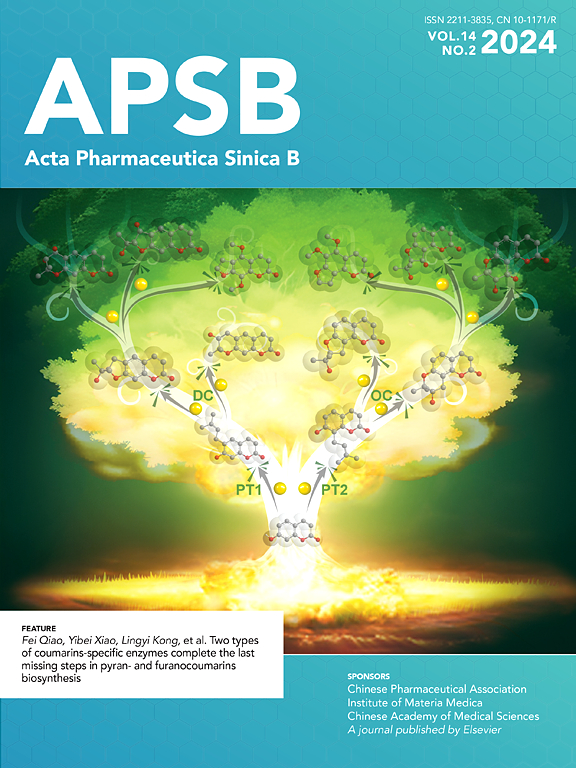eIF3a function in immunity and protection against severe sepsis by regulating B cell quantity and function through m6A modification
IF 14.7
1区 医学
Q1 PHARMACOLOGY & PHARMACY
引用次数: 0
Abstract
eIF3a is a N6-methyladenosine (m6A) reader that regulates mRNA translation by recognizing m6A modifications of these mRNAs. It has been suggested that eIF3a may play an important role in regulating translation initiation via m6A during infection when canonical cap-dependent initiation is inhibited. However, the death of animal model studies impedes our understanding of the functional significance of eIF3a in immunity and regulation in vivo. In this study, we investigated the in vivo function of eIF3a using eIF3a knockout and knockdown mouse models and found that eIF3a deficiency resulted in splenic tissue structural disruption and multi-organ damage, which contributed to severe sepsis induced by Lipopolysaccharide (LPS). Ectopic eIF3a overexpression in the eIF3a knockdown mice rescued mice from LPS-induced severe sepsis. We further showed that eIF3a maintains a functional and healthy immune system by regulating B cell function and quantity through m6A modification of mRNAs. These findings unveil a novel mechanism underlying sepsis, implicating the pivotal role of B cells in this complex disease process regulated by eIF3a. Furthermore, eIF3a may be used to develop a potential strategy for treating sepsis.

eIF3a通过m6A修饰调节B细胞的数量和功能,起到免疫和保护严重脓毒症的作用
eIF3a是一种n6 -甲基腺苷(m6A)阅读器,通过识别这些mRNA的m6A修饰来调节mRNA翻译。有研究表明,在感染期间,当规范帽依赖性起始被抑制时,eIF3a可能在通过m6A调控翻译起始中发挥重要作用。然而,动物模型研究的死亡阻碍了我们对eIF3a在体内免疫和调节中的功能意义的理解。在本研究中,我们通过eIF3a敲除和敲低小鼠模型研究了eIF3a的体内功能,发现eIF3a缺乏导致脾组织结构破坏和多器官损伤,导致脂多糖(lipopolaccharide, LPS)诱导的严重脓毒症。eIF3a敲低小鼠中异位过表达eIF3a可使小鼠免于lps诱导的严重败血症。我们进一步发现eIF3a通过m6A修饰mrna来调节B细胞的功能和数量,从而维持一个功能健全的免疫系统。这些发现揭示了脓毒症的新机制,暗示了B细胞在这个由eIF3a调节的复杂疾病过程中的关键作用。此外,eIF3a可能用于开发治疗败血症的潜在策略。
本文章由计算机程序翻译,如有差异,请以英文原文为准。
求助全文
约1分钟内获得全文
求助全文
来源期刊

Acta Pharmaceutica Sinica. B
Pharmacology, Toxicology and Pharmaceutics-General Pharmacology, Toxicology and Pharmaceutics
CiteScore
22.40
自引率
5.50%
发文量
1051
审稿时长
19 weeks
期刊介绍:
The Journal of the Institute of Materia Medica, Chinese Academy of Medical Sciences, and the Chinese Pharmaceutical Association oversees the peer review process for Acta Pharmaceutica Sinica. B (APSB).
Published monthly in English, APSB is dedicated to disseminating significant original research articles, rapid communications, and high-quality reviews that highlight recent advances across various pharmaceutical sciences domains. These encompass pharmacology, pharmaceutics, medicinal chemistry, natural products, pharmacognosy, pharmaceutical analysis, and pharmacokinetics.
A part of the Acta Pharmaceutica Sinica series, established in 1953 and indexed in prominent databases like Chemical Abstracts, Index Medicus, SciFinder Scholar, Biological Abstracts, International Pharmaceutical Abstracts, Cambridge Scientific Abstracts, and Current Bibliography on Science and Technology, APSB is sponsored by the Institute of Materia Medica, Chinese Academy of Medical Sciences, and the Chinese Pharmaceutical Association. Its production and hosting are facilitated by Elsevier B.V. This collaborative effort ensures APSB's commitment to delivering valuable contributions to the pharmaceutical sciences community.
 求助内容:
求助内容: 应助结果提醒方式:
应助结果提醒方式:


